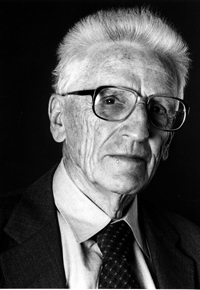Leanne Rivlin (born 1929) is an originator of the Environmental Psychology Doctoral Program at the CUNY Graduate Center in the late 1960s.[ citation needed ]

Albert Bandura was a Canadian-American psychologist. He was a professor of social science in psychology at Stanford University.

Donald Redfield Griffin was an American professor of zoology at various universities who conducted seminal research in animal behavior, animal navigation, acoustic orientation and sensory biophysics. In 1938, while an undergraduate at Harvard University, he began studying the navigational method of bats, which he identified as animal echolocation in 1944. In The Question of Animal Awareness (1976), he argued that animals are conscious like humans. Griffin was the originator of the concept of mentophobia: the denial of the consciousness of other animals by scientists.
Applied psychology is the use of psychological methods and findings of scientific psychology to solve practical problems of human and animal behavior and experience. Educational and organizational psychology, business management, law, health, product design, ergonomics, behavioural psychology, psychology of motivation, psychoanalysis, neuropsychology, psychiatry and mental health are just a few of the areas that have been influenced by the application of psychological principles and scientific findings. Some of the areas of applied psychology include counseling psychology, industrial and organizational psychology, engineering psychology, occupational health psychology, legal psychology, school psychology, sports psychology, community psychology, neuropsychology, medical psychology and clinical psychology, evolutionary psychology, human factors, forensic psychology and traffic psychology. In addition, a number of specialized areas in the general area of psychology have applied branches. However, the lines between sub-branch specializations and major applied psychology categories are often mixed or in some cases blurred. For example, a human factors psychologist might use a cognitive psychology theory. This could be described as human factor psychology or as applied cognitive psychology. When applied psychology is used in the treatment of behavioral disorders there are many experimental approaches to try and treat an individual. This type of psychology can be found in many of the subbranches in other fields of psychology.
Community psychology is concerned with the community as the unit of study. This contrasts with most psychology which focuses on the individual. Community psychology also studies the community as a context for the individuals within it, and the relationships of the individual to communities and society. Community psychologists seek to understand the functioning of the community, including the quality of life of persons within groups, organizations and institutions, communities, and society. They aim to enhance the quality of life through collaborative research and action.
David Paul Ausubel was an American psychologist. His most significant contribution to the fields of educational psychology, cognitive science, and science education learning was on the development and research on "advance organizers" since 1960.
Environmental psychology is a branch of psychology that explores the relationship between humans and the external world. It examines the way in which the natural environment and our built environments shape us as individuals. Environmental psychology emphasizes how humans change the environment and how the environment changes humans' experiences and behaviors. The field defines the term environment broadly, encompassing natural environments, social settings, built environments, learning environments, and informational environments. According to an article on APA Psychnet, environmental psychology is when a person thinks of a plan, travels to a certain place, and follows through with the plan throughout their behavior.
School violence includes violence between school students as well as attacks by students on school staff and attacks by school staff on students. It encompasses physical violence, including student-on-student fighting, corporal punishment; psychological violence such as verbal abuse, and sexual violence, including rape and sexual harassment. It includes many forms of bullying and carrying weapons to school. The one or more perpetrators typically have more physical, social, and/or psychological power than the victim. It is a widely accepted serious societal problem in recent decades in many countries, especially where weapons such as guns or knives are involved.
Urie Bronfenbrenner was a Russian-born American psychologist best known for using a contextual framework to better understand human development. This framework, broadly referred to as 'ecological systems theory', was formalized in an article published in American Psychologist, articulated in a series of propositions and hypotheses in his most cited book, The Ecology of Human Development and further developed in The Bioecological Model of Human Development and later writings. He argued that natural experiments and applied developmental interventions provide valuable scientific opportunities. These beliefs were exemplified in his involvement in developing the US Head Start program in 1965. Bronfenbrenner's writings about the limitations of understanding child development solely from experimental laboratory research and the potential for using contextual variability to provide insight into developmental processes was important in changing the focus of developmental psychology.
Gary Winkel is an environmental psychologist noted for his contribution to the establishment of the Environment and Behavior, a journal seen as an indication of the recent growth of Environmental Psychology as a field. He is a professor of Environmental Psychology at the Graduate Center of the City University of New York.
Irwin Altman, is a social psychologist who earned his B.A. degree from New York University in 1951, his M.A. degree from the University of Maryland in 1954 and his Ph.D. from the University of Maryland in 1957. He is active in many groups and associations including the International Association of Applied Psychology, American Psychological Association, American Association for the Advancement of Science, American Association of University Professors, Society for the Psychological Study of Social Issues, Society of Experimental Social Psychology, Society of Personality and Social Psychology, Association for the Study of Man-Environment Relations, Environmental Design Research Association, and the Western Psychological Association. He is currently an emeritus faculty member at the University of Utah, Salt Lake City.
Conservation psychology is the scientific study of the reciprocal relationships between humans and the rest of nature, with a particular focus on how to encourage conservation of the natural world. Rather than a specialty area within psychology itself, it is a growing field for scientists, researchers, and practitioners of all disciplines to come together and better understand the Earth and what can be done to preserve it. This network seeks to understand why humans hurt or help the environment and what can be done to change such behavior. The term "conservation psychology" refers to any fields of psychology that have understandable knowledge about the environment and the effects humans have on the natural world. Conservation psychologists use their abilities in "greening" psychology and make society ecologically sustainable. The science of conservation psychology is oriented toward environmental sustainability, which includes concerns like the conservation of resources, conservation of ecosystems, and quality of life issues for humans and other species.
Eugene Galanter (1924–2016) was one of the modern founders of cognitive psychology. He was an academic in the field of experimental psychology and an author. Dr. Galanter was Professor Emeritus of Psychology and Quondam Director of the Psychophysics Laboratory at Columbia University. He was also the co-founder, Chairman of the Board of Directors and Chief Scientific Officer of Children’s Progress, an award-winning New York City-based company that specializes in the use of computer technology in early education. The company's assessments and reports have been used in 40 states and 9 countries.
The developmental niche is a theoretical framework for understanding and analyzing how culture shapes child development. Developed by Charles M. Super and Sara Harkness. It is theoretically related to, and shares some origins with, Weisner’s “ecocultural niche,” and Worthman’s “developmental microniche.” See also "evolved developmental niche."
Organizational space, sometimes called organizational architecture, describes the influence of the spatial environment on the health, the mind, and the behavior of humans in and around organizations. It is an area of scientific research in which interdisciplinarity is a central perspective. It draws from management, organization and architecture added with knowledge from, for instance, environmental psychology, social medicine, or spatial science. In essence, it may be regarded as a special field of expertise of organization studies and change management applied to architecture. The knowledge area is related to evidence-based design in which the influence of the spatial environment on patient's health, healing, and customer satisfaction are being researched in health care. It is also related to practice-based areas of management such as facility management which is primarily devoted to the maintenance and care of commercial or institutional buildings and to property management in which the operation of real estate is central. The scientific field of organizational space must be distinguished from social architecture in which the development of information and communication technologies is central and also different from space science which is concerned with the study of the universe.
Psychological behaviorism is a form of behaviorism—a major theory within psychology which holds that generally human behaviors are learned—proposed by Arthur W. Staats. The theory is constructed to advance from basic animal learning principles to deal with all types of human behavior, including personality, culture, and human evolution. Behaviorism was first developed by John B. Watson (1912), who coined the term "behaviorism", and then B. F. Skinner who developed what is known as "radical behaviorism". Watson and Skinner rejected the idea that psychological data could be obtained through introspection or by an attempt to describe consciousness; all psychological data, in their view, was to be derived from the observation of outward behavior. The strategy of these behaviorists was that the animal learning principles should then be used to explain human behavior. Thus, their behaviorisms were based upon research with animals.
Human ethology is the study of human behavior. Ethology as a discipline is generally thought of as a sub-category of biology, though psychological theories have been developed based on ethological ideas. The bridging between biological sciences and social sciences creates an understanding of human ethology. The International Society for Human Ethology is dedicated to advancing the study and understanding of human ethology.
Psychology encompasses a vast domain, and includes many different approaches to the study of mental processes and behavior. Below are the major areas of inquiry that taken together constitute psychology. A comprehensive list of the sub-fields and areas within psychology can be found at the list of psychology topics and list of psychology disciplines.

Karl Ulrich Smith was an American physiologist, psychologist and behavioral cybernetician.

Place attachment is the emotional bond between person and place, and one way of describing the relationship between people and spatial settings. It is highly influenced by an individual and his or her personal experiences. There is a considerable amount of research dedicated to defining what makes a place "meaningful" enough for place attachment to occur. Schroeder (1991) notably discussed the difference between "meaning" and "preference," defining meaning as "the thoughts, feelings, memories and interpretations evoked by a landscape" and preference as "the degree of liking for one landscape compared to another."
Beth Sulzer-Azaroff was a psychologist and pioneering figure in the field of behavior analysis. She conducted research on organizational behavior management and promoted the use of applied behavior analysis for teaching children with autism. The Federation of Associations in Behavioral & Brain Sciences noted her contributions as "instrumental in translating findings from the basic behavior analytic laboratory to the applied setting, from the classroom to the factory."